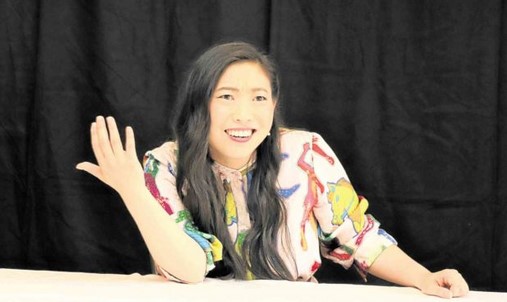Actress and comedian Awkwafina responds with a statement on Twitter about the issue of past use of African American Vernacular English (AAVE), also known as “blaccent.” Some on social media expressed their criticisms of the actress’ statement saying it’s “vague” and “unapologetic.”
The Asian American actress, real name Nora Lum, has starred in films Crazy Rich Asians and Shang-Chi and The Legend of the Ten Rings. If you’ve watched her in those films, one thing that’s distinct about her is her style of speaking. The actress is criticized for her use of AAVE and manner of speech that is often associated with Black stereotypes.
https://twitter.com/awkwafina/status/1489963501682675712
Awkwafina has been previously been attacked several times for cultural appropriation and until recently she tweeted her statement about the issue. She acknowledged that African Americans have ”historically and routinely seen their culture stolen, exploited and appropriated by the *dominant* culture for monetary gain without acknowledgment nor respect for where those roots come from.”
She further discussed that appropriation is a problem we face today and things like “‘internet TikTok slang generation’ that liberally uses AAVE”, “Hip-hop”, and “linguistic acculturation” play a “fine line between offense and pop culture.”
Awkwafina explained how her immigrant background has shaped her persona from the movies and shows she has watched and even her love for pop culture. “I think as a group, Asian Americans are still trying to figure out what that journey means for them,” she said. “I know for sure that I want to spend the rest of my career doing nothing but uplifting our communities.”
The actress concluded her statement by saying “But as a non-black POC, I stand by the facts that I will always listen and work tirelessly to understand the history and context of AAVE, what is deemed appropriate or backwards toward the progress of ANY and EVERY marginalized group.” Awkwafina emphasized that “To mock, belittle, or to be unkind in any way possible at the expense of others is: Simply. Not. My. Nature. It never has, and it never was.”
After the actress posted her statement, she announced that she will be retiring from Twitter.
https://twitter.com/awkwafina/status/1489996505100558347?s=20&t=41ATiSphTtD5-APCQsScww
But, many didn’t take her statement as an “apology” and called her out for liking tweets from people saying that she did nothing wrong. A week after her statement, the actress still received backlash from her Super Bowl commercial pointing out her ‘dropped’ accent.
All these words and not one apology.
Awkwafina could have just said: "You were right. I did use a blaccent to make a name for myself and that was wrong. I wholeheartedly apologize, and I'll do better from now on." https://t.co/3CDsw962B7
— Britni Danielle (@BritniDWrites) February 5, 2022
I cannot stand when people do this shit. They ""apologize"" but then like tweets of people saying they did nothing wrong.
— zen or brooke (she/her) (@ZenMeoww) February 5, 2022
https://twitter.com/makeupbyjoxlyn/status/1490107101536034823
Look at Awkwafina talking without her blaccent.
How quickly it got dropped once she made mainstream.
— Darth Deadass (@sylphanne) February 14, 2022
Hmm didn't hear any blaccent in Awkwafina's Disney+ #SuperBowl commercial. 😏 Lesson learned?
— Emmanuel (E-Man) Noisette (@EmansReviews) February 14, 2022
.@awkwafina Nice super bowl commercial. No blaccent. Funny how things change when it’s no longer benefits you.
— Auntkaren0 (@Auntkaren01) February 14, 2022
Some people felt like the more successful Awkwafina became, the less AAVE she was using which they believed she was doing for her benefit. In January, Awkwafina was nominated by the NAACP for an “Outstanding Character Voice-over Performance – Motion Picture” in her role as Sisu of the Raya and the Last Dragon.
Other POP! stories you might like:
Adele gets backlash for acceptance speech for gender-neutral artist award



